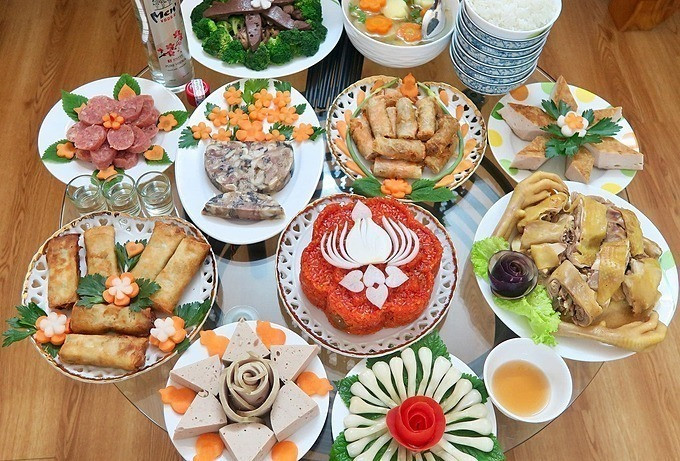Drunk, Mr. Truong, 40 years old, quickly drank the bowl of soup left on the table. A few hours later, he had a stomachache, diarrhea, and sweating, and had to be hospitalized.

Tet holiday tray
Mr. Truong is an only child, living in Thuong Tin district. His father is the head of the family, so from the 30th to the 4th of Tet, every day the family cooks 3-4 trays of food to burn incense on the family altar and the family altar. According to custom, the trays of food are left on the altar for about two hours. When the trays are taken down, the food is cold, the fat is frozen, and the rice is dry.
"After the offering, the mother-in-law put away the new tray of food and took the food from the previous offering tray in the refrigerator, reheating it so as not to waste it," said Ms. Huong, Mr. Truong's wife. Therefore, for the entire week of Tet, the whole family only ate the old food. The dishes were constantly repeated, such as bamboo shoot soup, banh chung, boiled chicken, and sticky rice. Mr. Truong reminded them many times, but his parents believed that for decades the family had been eating the same food, "their health was still good, even more resilient than people of the same age."
Last year at New Year's Eve dinner, he got drunk and ate the soup that his son had prepared the day before but forgot to put in the refrigerator. As a result, the man suffered from food poisoning, vomiting, diarrhea, sweating, and was rushed to Ngoc Hoi Hospital for emergency treatment. "Luckily, I was still able to leave the hospital on the night of the 30th to return home before New Year's Eve," Mr. Truong recalled.
Also having to regularly consume "leftover rice and cold food", Ms. Trang, 40 years old, many times did not want to go home to celebrate Tet with her parents. Being frugal, her mother often reused old food such as chicken, bamboo shoots, and vermicelli from many days ago to cook again. In addition, food such as chicken, pork, and fish sent to Hanoi by relatives in the countryside were not carefully preserved, so they often became slimy, rancid, and had a strong smell.
"My parents felt sorry for the food so they took it out to cook, but people who ate it got bloating, indigestion, and digestive disorders," she said.
Dr. Nguyen Van Thanh, Department of Internal Medicine, Hanoi Medical University, said that Tet is the longest holiday of the year and also the time when people gather with their families, so it is easy to be subjective about health and eat unscientifically. Eating too much food is harmful to health or eating unhygienic food increases the risk of disease. When reheated, food often loses nutrients, and many foods can easily cause poisoning due to bacterial contamination.
Some fried dishes when recooked often become dry, lose nutrients, and absorb more oil. Reheated white rice is often difficult to swallow because it is hard and dry. Leaving food overnight can cause mold and spoilage.
Soups, soups, and vegetables should not be left overnight or recooked many times, which is not good for health, especially for people with diseases such as high blood pressure, cardiovascular disease, diabetes, dyslipidemia, gout, kidney disease, overweight or obesity...
Reheated food is often salty, which is harmful to people with kidney disease, causing edema, high blood pressure and affecting kidney function, making the disease worse because it has to work harder. Eating salty foods is also not good for people with heart failure, high blood pressure, cirrhosis. You should also limit foods high in salt such as pickled vegetables, dried seafood, canned foods, processed foods, fast food...
Similarly, Associate Professor, Doctor Lam Vinh Nien, Head of the Department of Nutrition and Dietetics, University of Medicine and Pharmacy Hospital, Ho Chi Minh City, said that people should eat on time and limit cooking many times. Eating more green vegetables, fresh fruits, and yogurt will reduce bloating and indigestion caused by consuming too much greasy food during Tet.
You should only eat until you are 80% full, balancing the three energy-producing substances: carbohydrates, protein, and fat. Carbohydrates should be supplemented at 50-60%, and should be chosen from vegetables and fruits, in addition to brown bread, brown rice, potatoes... in the recommended amount.
Choose snacks such as low-sugar fresh fruit, low-sugar dried fruit, nuts (almonds, pumpkin, walnuts, cashews, sunflower seeds...) instead of cakes, jams, and sweets. Reduce salty foods such as pickles, pickled eggplants...
Limit alcohol, which increases the risk of cardiovascular disease, gout, high blood pressure, diabetes...
People who are overweight, obese, have blood glucose disorders, or have diabetes should limit sweet and high-energy ripe fruits such as bananas, mangoes, jackfruit, lychees, etc.
TH (according to VnExpress)